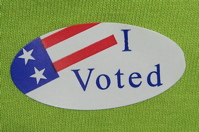 California held its primary four days ago. Twenty-eight percent of eligible voters, an all-time low for a statewide election, appeared at the polls. Despite the ghost-town turnout, the votes are still being tallied in my county, Alameda. That’s because its Diebold voting machines were decertified — among other real and perceived shortcomings, they don’t produce a receipt or any kind of “paper trail” documenting votes cast — and elections officials decided to give the people what they said they wanted: supposedly unhackable paper ballots. In turning back the clock on election technology, the registrar of voters leapfrogged over the system the Diebold machines replaced: punch-cards. To avoid awakening bad chad memories, the county adopted a ballot that required voters to bubble in their choices in black ink. The ballots are machine readable, but the automation only goes so far: All week on the news, we got to see pictures of bored election workers feeding ballots one at a time into the readers. The registrar’s latest press release says 8,000 absentee ballots still need to be counted. And after that, 11,000 “provisional” ballots cast by people who had some sort of problem at the polls. And after that, a smaller but unknown number of damaged or machine-unreadable ballots.
California held its primary four days ago. Twenty-eight percent of eligible voters, an all-time low for a statewide election, appeared at the polls. Despite the ghost-town turnout, the votes are still being tallied in my county, Alameda. That’s because its Diebold voting machines were decertified — among other real and perceived shortcomings, they don’t produce a receipt or any kind of “paper trail” documenting votes cast — and elections officials decided to give the people what they said they wanted: supposedly unhackable paper ballots. In turning back the clock on election technology, the registrar of voters leapfrogged over the system the Diebold machines replaced: punch-cards. To avoid awakening bad chad memories, the county adopted a ballot that required voters to bubble in their choices in black ink. The ballots are machine readable, but the automation only goes so far: All week on the news, we got to see pictures of bored election workers feeding ballots one at a time into the readers. The registrar’s latest press release says 8,000 absentee ballots still need to be counted. And after that, 11,000 “provisional” ballots cast by people who had some sort of problem at the polls. And after that, a smaller but unknown number of damaged or machine-unreadable ballots.
I kind of wonder whether I’m one of the people whose ballot wound up in the provisional or damaged piles. What happened was this: When Kate and I went to the polls Tuesday night, all she had to do was turn in her filled-out absentee ballot. I still like to go through the exercise of going to the polls, so I went through the routine: Giving my name and address to the poll workers, signing the register, and getting my Democratic Party ballot. This time, it came in a legal-size manila folder. The voting booth — it’s really more of a spindly, collapsible lectern — was equipped with a pen on a string. I pulled out the ballot and started to bubble it in.
Several of the races had candidates running unopposed; and several of those involved officeholders who are trying to move into new posts because term limits are forcing them to move on; for instance: Cruz Bustamante, the lieutenant governor, who was the only Democratic candidate on offer for state insurance commissioner (the old insurance commissioner, John Garamendi, was running for lieutenant governor against two term-limited state legislators). There’s something tired and dispiriting about seeing these guys — mostly guys — swap seats with little more to recommend them than the fact hardly anyone can remember a time they weren’t haunting some committee room in Sacramento.
It’s not the first time the thought has occurred to me. Usually, I’d just pass on the uncontested races. But I don’t usually vote with a pen in my hand. With the punch-card and touchscreen voting systems, it was possible, but painful, to cast a write-in vote. With the paper ballot and the nice black felt-tip pen in the booth, confronted with the bland nothingness of an unopposed Cruz Bustamante, a write-in suddenly seemed appealing. So for every uncontested, or feebly contested, office, I cast a write-in vote. I was stumped at first about who I might vote for, but then I thought about some of my smarter and more conscientious friends. So Piero and Jill, across the street, got votes for the state Legislature; I voted for Bill for U.S. Senate (time for Feinstein to go); Larry was my choice for state insurance commissioner, and Kate got the nod for state schools superintendent. I was aware when I turned in my ballot that some poor elections worker would be forced to try to make sense of my impaired-looking block printing.
Throw-away votes? Maybe, though I feel I’d trust my choices in office at least as much as I’d trust the party retreads.I admit if I had felt anything was on the line, my friends would have lost out. Still, I walked away from the polling place feeling better about my vote than I have in a long time.
Technorati Tags: berkeley, california, democracy, election
